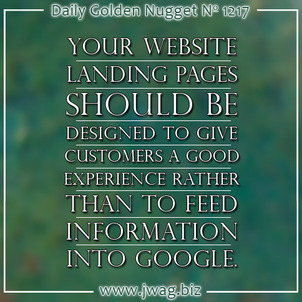
Popular pages on your website are often called "Landing Pages." That popularity can be measured as the number of people who click on a page while browsing around your site, or the number of people that Google and Bing send to your site.
When you place an ad in the newspaper or send out a direct mail piece, you usually include a website address on that ad. Most of the time, that website address will just be your domain name, like exampledomain.com, in which case the landing page would be your website's home page.
Sometimes, instead of your home page, you might have a special website address like exampledomain.com/event, in which case the "event" page is your landing page.
The goal of a landing page is to capture attention and get people to dig down further into your website. Sometimes that goal is to get them to sign up for an email list or make a purchase, but for most retail jewelers, the simple goal is to get them to stay longer on the website and hopefully visit the store.
When it comes to Google and Bing, we refer to a landing page as the pages that have the highest search rank for any given keyword. Those highly ranked pages attract people to your site, and those are the pages people "land on" when they first arrive on your site.
Your most popular landing page will always be your home page. It always ranks highest in search and you are more likely to include it in your print ads than any other address. You should update your home page on a regular basis, especially to include images of any print ads or headlines so you can direct those interested people to the specific ad details.
Even though your home page is the most popular page, I want to skip that for the moment and talk about other landing pages you have on your site.
Natural landing pages will develop throughout your site simply because of the way you've organized your navigation. For example, the page you bring people to when they click the "Jewelry Catalog" link would represent the landing page for your entire online catalog. Another example would be the page you bring people to when they click "Our Services" from the main navigation.
The main catalog page and the main services page should both include an overview of what visitors should find within all the pages under that heading. Everything you include on those pages should be there for a reason, and it should make sense according to the perceived expectations of your visitors.
It takes a long time to figure out what will work well on one of these organic landing pages, and it usually requires a lot of study of your Google Analytics and even some A/B testing.
Other than the natural landing page, you also have the specific landing pages that you need to create for a purpose, like the exampledomain.com/event landing page I mentioned above.
That "event" page would need all the information for that event without requiring the person to click to more pages. The details would be simple things like time and date, what they would expect to find, photos from previous similar events, full descriptions of the items they might see at the event and information about the people they might meet at the event. It really is a self contained one page website with all the details.
Some of the details you present on that page might be repeated from other areas of your website, but that's okay because it makes the information faster to get to than to have someone clicking around your site. I'm referring to information like a staff bio, or product images and descriptions. You could pull excerpts from a blog post, but don't reprint a full blog post on the event page.
Keep in mind that it needs to make sense for your customer to read, and you don't want to bore them to tears while they read.
You would use this similar strategy when creating a landing page for your AdWords ads.
Recently Google announced that they were working to improve how they rank doorway pages. Although some people might view doorway pages and landing pages as the same thing, Google doesn't seem to.
They view doorway pages as specific pages created solely for search engines. You see, some sites will create several identical doorway pages have the same information repeated, but they change only one or two words.
Imagine that I create an event page for all the residents of Totowa, NJ. I use the phrase "Totowa, NJ" several times on the page in hopes to rank highly for that town. That single page by itself is not a problem, but it will become a problem if I create the same exact page a second time where I use "Springfield, NJ" instead of "Totowa, NJ." Suddenly I fall into the classification of what Google calls a doorway page.
One doorway attracts people from Totowa, the other doorway attracts people from Springfield. This is a common SEO technique and some agencies have set this up on jewelry websites as a way to rank their store for different local towns.
The bottom line of today's Daily Golden Nugget is to realize that some pages of your site are more important than others, but no matter what the page is, you should always make sure that the page is not built to manipulate the search engines and that it will satisfy the customer's expectations.








